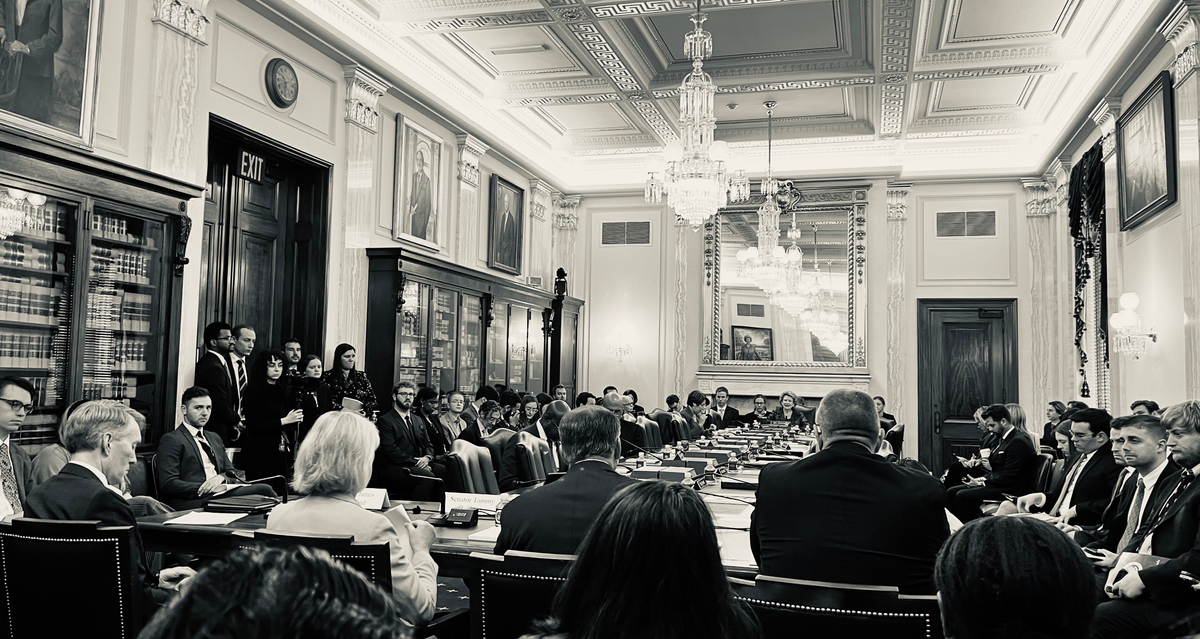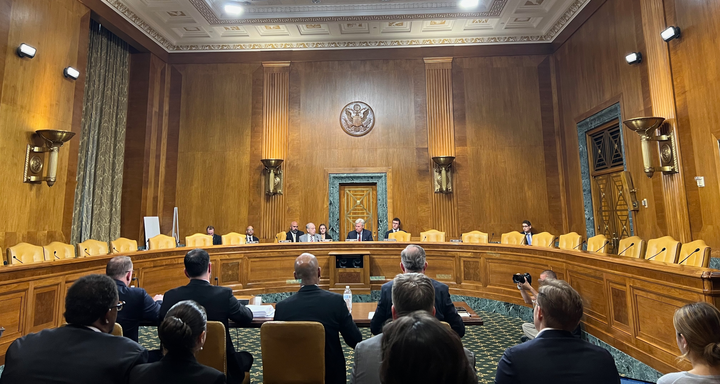The U.S. Senate Committee on Agriculture, Nutrition and Forestry held a hearing to examine the impact of foreign investments in agriculture on U.S. food systems and supply chains.
According to the USDA, the food and agriculture industry supports more than 21 million jobs and contributes roughly $1.2 trillion to the American economy.
In 2021, the U.S. Department of Agriculture reported over 40 million acres of American farm and forest land are held by foreign investors, representing just over 3% of all privately held agricultural land. While this is a small fraction of overall agricultural land, Senate Committee Chairwoman Debbie Stabenow (D-MI) stipulated, “Foreign ownership has increased 66% since 2010, nearly 2 million acres per year”.
AFIDA’s Blind Spots: Piecing Together Foreign Land Ownership
During the Senate hearing that took place September 28, committee officials shed light on critical deficiencies in oversight, exposing unsettling inadequacies in the way foreign-held investments are tracked on a national level. The Agricultural Foreign Investment Disclosure Act (AFIDA) requires foreign investors who acquire, transfer, or hold an interest in U.S. agricultural land to self-report their holdings.
Deputy Under Secretary for Farm Production and Conservation, Gloria Montaño Greene, testified before the Senate, offering insights into the convoluted process of tracking foreign-owned agricultural land.
"The USDA gathers information from more than 3,000 counties and county equivalents across the United States, each operating within its own jurisdiction, feeding information into over 50 disparate state systems. Additionally, there are 500 sovereign tribal nations, each boasting distinct laws, rules, and processes governing land ownership and transfer," said Montaño Greene.
To further exacerbate the issue, Greene highlighted the understaffed and under-resourced nature of the USDA unit tasked with collecting foreign ownership data. The AFIDA filing system is primarily paper-based, suffers from low data quality as well as a concerning number of missing records, rendering it challenging to ascertain the true nature and magnitude of foreign-owned agricultural land investments. Section 773 of the Consolidated Appropriation Act designated an update to the AFIDA reporting system, but no funding was given to implement any changes, so the department relies on cost efficient methods which are little more than excel spreadsheets in a queryable database.
In 2021, the USDA reported Canada as the largest foreign investor with 12.8 million acres, or 31% of foreign held land, followed by Netherlands, Italy, United Kingdom, and Germany collectively holding approximately 12.4 million acres. The remaining 15.6 million acres reported, or 38% are held by various other countries. China reported holding 383,935 acres, or slightly less than 1% of foreign land investments.
Harvesting Influence: Uncovering Foreign Plots In American Fields
According to the USDA, Chinese ownership in U.S. farmland increased from $81 million in 2010 to $1.8 billion in 2020, with the purchase of farmland in close proximity to critical U.S. infrastructure. A Chinese billionaire bought over 140,000 acres of land next to the Laughlin Air Force Base along the Mexican border in southern Texas. The base is home to the 47th Flying Training Wing, one of the world’s premier pilot training wings that specializes in deploying mission-ready airmen. In North Dakota, a Chinese conglomerate initiated a corn milling plant less than 12 miles from an air base in Grand Forks, where sensitive hypersonic development takes place. In August 2023, Grand Forks Air Base was selected for the Space Development Agency’s first ground operations and integration center, where they oversee the operations of numerous satellites and the development of wartime capabilities.
By acquiring land near vital U.S. infrastructure, foreign entities can potentially gain access to sensitive areas, compromising national security and defense readiness. There is a fear that foreign ownership may enable espionage, surveillance, or even sabotage activities, undermining the nation's strategic interests.
A report by Policy Analyst with the U.S. China Economic and Security Review Commission, Lauren Greenwood Menon shows that “While Chinese entities held slightly less than 1 percent of all foreign-held acres in the United States in 2020, the volume of their holdings increased dramatically over the preceding decade”, this jump is owed chiefly to Shuanghui’s 2013 purchase of Smithfield Foods, says Menon, who recently supported a hearing on China’s global influence and interference activities.
The Oklahoma Green Rush and Cartel Intrusion
Senator James Lankford (R-OK) detailed a disturbing undercurrent in the state of Oklahoma- the infiltration of drug cartels into the state’s burgeoning cannabis farms. Oklahoma's cannabis industry is driven by its relatively loose regulations and licensing process, providing an appealing opportunity for drug cartels to infiltrate the legitimate market.
“The year after we passed a medical marijuana law in our state, Oklahoma had more land sales to foreign entities than any other state in the nation” said Sen. Lankford, “We have 7000 licensed marijuana growers in our state, thousands of those are actually illegal operations that haven't gone through the full licensing capability.”
Politico reported close to 3,000 of the state’s 7,000 licensed marijuana farms have been flagged for suspicious activity by law enforcement over the past year. The Oklahoma Bureau of Narcotics (OBN) has shut down 800 of these farms in the last two years for operating illegally, and according to the OBN roughly 75% have been linked to China.
In December 2022, NBC covered a story in Kingfisher Country, Oklahoma where 4 Chinese nationals were executed at an illegal marijuana farm by another Chinese national, Wu Chen, who later identified himself as an investor. Chen opened fire on employees after demanding $300,000 as a return for his investment.
On a local level, Oklahoma law enforcement is having a difficult time, said Sen. Lankford, “because if they pull someone over, they don't speak English, they speak Mandarin, and it's become its own unique challenge.”
Sovereign Soil: Legislating Foreign Investments In U.S. Agriculture
During the Senate Committee hearing several bills were introduced that would give lawmakers the jurisdiction needed to access foreign-held land investments and prohibit adversarial nations from purchasing U.S. land. Twenty-four states have laws that restrict foreign ownership and investments in private farmland, however, no federal law exists that restricts them, the federal government only monitors foreign acquisitions in landholdings.
A bill sponsored by Senator Mike Braun (R-IN) and cosponsored by Senators Jon Tester (D-MT), Marco Rubio (R-FL), and Tommy Tuberville (R-AL) called, Protecting America’s Agricultural Land from Foreign Harm Act of 2023 prohibits the purchase or lease of agricultural land from entities associated with the governments of China, Russia, Iran, and North Korea. This bill builds on another cross-party collaboration between Senators Mike Rounds (R-SD)and Jon Tester (D-MT), the Promoting Agriculture Safeguards and Security (PASS) Act of 2023. In July 2023, the senate voted to include the PASS Act as an amendment to the National Defense Authorization Act (NDAA) requiring the Committee on Foreign Investment in the United States (CFIUS) to review transactions between foreign investments in private U.S. agriculture.
A bill sponsored by Senator James Lankford (R-OK) and cosponsored by Senators Michael Bennet (D-CO), Jim Risch (R-ID), and Thom Tillis (R-NC) called, Security and Oversight of International Landholdings (SOIL) Act will require CFIUS to review real estate purchase from non-market economies and countries that pose a national security risk to the United States. The legislation also prohibits federal assistance for certain foreign-held real estate holdings, broadens disclosure requirements for land purchases made by foreign entities, and increases USDA reporting on land acquisitions by foreign entities.
U.S. Senator Joni Ernst (R-Iowa), a member of the Senate Agriculture Committee advocated for her bill, the Foreign Agricultural Restrictions to Maintain Local Agriculture and National Defense (FARMLAND) Act. This legislation, cosponsored by Sen. Stabenow (D-MI), seeks to modernize the existing Agricultural Foreign Investment Disclosure Act (AFIDA) of 1978, initially established to create a nationwide system for monitoring foreign ownership of U.S. agricultural land.
“We have a voluntary filing system, and it’s still paper based,” said Senator Ernst, “we have a lot of work to do within the USDA to track this information, because if our U.S. tax dollars are going into foreign individuals, we need to know that.”
Senator Cory Booker (D-NJ) entered into the record his bill, Farmland for Farmers Act of 2023, legislation that would prohibit investment corporations from acquiring any additional U.S. farmland, ensuring farmland stays in the hands of rural America. According to Sen. Booker, “The bill would also make the hedge funds and pension funds, who currently own farmland ineligible for USDA safety net programs moving forward.” The bill is led by the National Family Farm Coalition and signed by over 70 farm groups.
Senators Tammy Baldwin (D-WI) and Chuck Grassley (R-IA) introduced bipartisan legislation called, the Farmland Security Act of 2023, which would require shell companies who buy American agriculture land report their holdings, as well as stiffer penalties for failure to file, and training of USDA staff to identify reporting failures.
Sen. Chuck Grassley (R-IA), Senate Agriculture Chairwoman Debbie Stabenow (D-MI) and Senators Joni Ernst (R-IA) and Jon Tester (D-MT), reintroduced legislation Food Security is National Security Act of 2023, to include the Secretary of Agriculture and the Secretary of Health and Human Services as members of the Committee on Foreign Investment. It would also include new agriculture and food-related criteria for CFIUS to consider when reviewing transactions that could result in control of a U.S. business by a foreign company.
Background information on the Committee on Foreign Investment and the Office of Foreign Investment in the United States can be found in an article published in Foreign Affairs by Lars Erik Schönander, Tracking Benign and Malign Foreign Investment in the United States.
Food Security: The Essential Link to National Resilience
As the U.S. grapples with this complex regulatory landscape, it is imperative that lawmakers and stakeholders collaborate to shore up oversight mechanisms, fortify reporting structures, and bridge the gaps that threaten to undermine the integrity of U.S. agricultural assets. The stakes are high, and the path to resolution demands a strategic and concerted effort to protect the nation's agricultural sovereignty. Without reliable data, the long-term impact on American farmers, rural communities, and national interests remains uncertain. As the committee works to write the next farm bill bipartisan unity aligns on a critical conclusion, food security is national security.






Comments ()